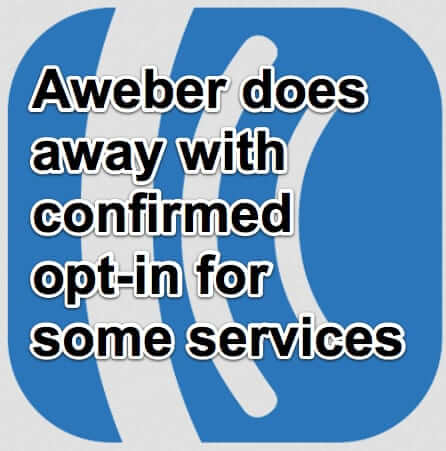
If you use Aweber, you probably received a notice from them today (December 28, 2018) saying that they were turning off confirmed opt-in (also known as double opt-in) – but only for certain integrations with certain 3rd parties.
As Aweber explained in their email “On January 15th, 2019, the AWeber team will be turning off Confirmed Opt-in for all subscribers added through any of the eCommerce integrations listed below: Digital Product Delivery, Easy Digital Download, MoonClerk, Nanacast, OpenCart, ProductDyno”
Now, generally speaking (and as the Institute for Social Internet Public Policy explains on their blog, Getting Email Delivered), confirmed opt-in (again, a/k/a “double opt-in”) is considered a fundamental part of best email practices for businesses.
What is confirmed opt-in? Confirmed opt-in, as compared to single opt-in, is when, before adding you to their mailing list, a business or other organization first requires you to confirm (hence ‘confirmed opt-in’) that you want to be put on their mailing list. The way it usually works is like this:
Step 1: Your email address is submitted to the business.
The Internet Patrol is completely free, and reader-supported. Your tips via CashApp, Venmo, or Paypal are appreciated! Receipts will come from ISIPP.
Step 2: The business sends a single email to your email address asking you to confirm that you really want to be added to their mailing list, and you are required to either reply to it, or click a link in it, to confirm that you do indeed want them to put your email address on their email list.
Step 3: After – and only after – they receive your confirmation, they add your email address to their mailing list.
Now, single opt-in, on the other hand, is when as soon as the business or other organization receives your email address they simply add it to their mailing list, whether you asked them to (let alone wanted them to) or not. In fact, this is enough of an issue that the Federal Trade Commission (FTC) last year asked for public comment about whether email marketers should be required (as they are in nearly all other countries) to use confirmed opt-in rather than just sticking your email address on their mailing list, requiring you to opt-out if you don’t want their email.
By now you probably get the idea that we at the Internet Patrol are pretty down on single opt-in; we agree with ISIPP (who offers one of the only two email reputation certification services around*) and the rest of the white-hat email industry that confirmed (double) opt-in is the gold standard.
So, when we got today’s email from Aweber, with whom we have a long-standing collegial and business relationship, saying that they were doing away with confirmed opt-in for some, we were, at first, dismayed.
Had Aweber turned to the dark side?
No.
What Aweber has done is recognized a reality. They are doing away with confirmed opt-in for 3rd-party integrations where – and this is key – the user is paying the business that is using Aweber in order to receive something from that business (often a digital product).
The reality that Aweber is recognizing is that if someone has paid for your product – and especially if it is a digital product – that pretty much confirms that they want to receive your product. Very few people are going to give good money for something that they don’t want to receive (at least in this context, we’re sure you can think of lots of things that people pay for that they don’t actually want to receive, in other contexts).
Now, it’s true that just because you purchase something from a business doesn’t mean that you want to be put on their mailing list. And so we are sure that for some of those integrations, there may be non-digital products that will be sold to someone – someone who does not want to automatically end up on that business’ mailing list.
However we are also sure that it’s true that Aweber, who have been providing these services for over 20 years, and who have always been at the fore of advocating for email best practices, has done a careful analysis of the details of signups that come to Aweber through these six ecommerce providers (Digital Product Delivery, Easy Digital Download, MoonClerk, Nanacast, OpenCart, and ProductDyno), and have determined that there is little likelihood of it being an issue.
(*The publishing division of ISIPP, ISIPP Publishing, is the parent company of The Internet Patrol)
The Internet Patrol is completely free, and reader-supported. Your tips via CashApp, Venmo, or Paypal are appreciated! Receipts will come from ISIPP.









